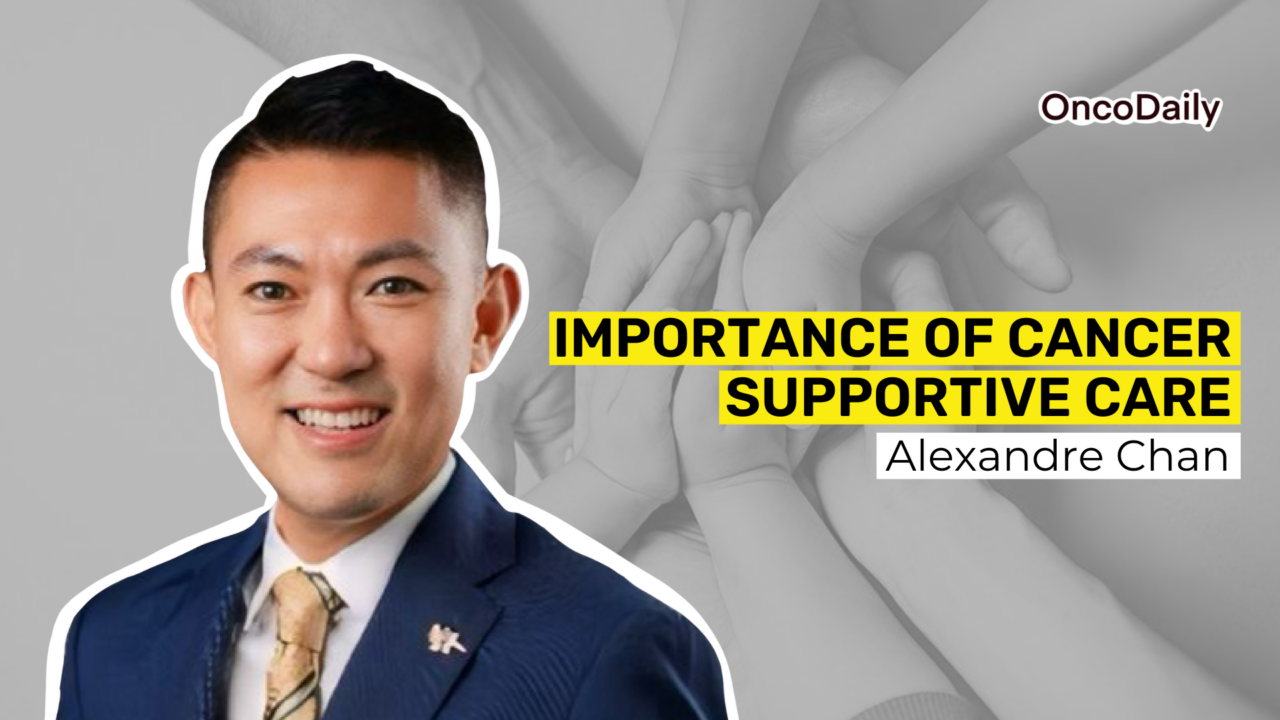
MASCC Highlights: Importance of Cancer Supportive Care | Alexandre Chan
In this episode of OncoDaily, Professor Alexandre Chan, President-Elect of the Multinational Association of Supportive Care in Cancer (MASCC) and a clinical pharmacy professor at the University of California, Irvine, shares insights from the latest MASCC annual meeting in Lille, France.
Hosted by Dr. Martin Harutyunyan, the discussion covers the conference’s focus on advancements in cancer-supportive care, with nearly 1,500 participants and over 1,000 abstracts presented. Professor Chan delves into key topics including survivorship, cognitive impairments, and strategies to reduce health disparities in low- and middle-income countries.
Alexandre Chan, PharmD, MPH, FCCP, FISOPP, BCPS, BCOP, APh is the Associate Editor-in-Chief at Supportive Care in Cancer. He is also the Founding Chair and Professor of Clinical Pharmacy at UCI School of Pharmacy and Pharmaceutical Sciences. He is also a board member at The Multinational Association of Supportive Care in Cancer (MASCC).
Dr. Martin Harutyunyan is a medical oncologist and palliative care specialist who currently serves as the Head of the Palliative Medicine Service at Yeolyan Hematology and Oncology Center in Yerevan, Armenia. He has been working as a medical oncologist at the same center since October 2021.
Dr. Harutyunyan has made significant contributions to research and patient care throughout his career. He has worked as a clinical researcher at the “City of Smile” Charitable Foundation and as a medical coordinator at the Union of Armenian Doctors.
Dr. Harutyunyan’s played a key role in the launch of a Palliative Medicine Service at Yeolyan Hematology and Oncology Center.
Hi, my name is Alex Chan. I am a professor of clinical pharmacy and also an oncology pharmacist from University of California, Irvine, which is located in Irvine, California. I’ve been a MASCC member since 2009 and currently I’m the president-elect for the organization.
I’m also the scientific chair for this year’s annual meeting. This year’s annual meeting for MASCC is happening in Lille, France, and we have close to 1,500 participants or delegates for this meeting from 56 countries. We also have close to a thousand abstracts that were submitted to this meeting.
Very high quality content on cancer supportive care. So as you know, cancer supportive care is extremely important as a topic for cancer patients who are undergoing cancer chemotherapy, as well as the survivorship phase as well. Essentially, supportive care should be provided from the point of diagnosis all the way until end of life.
So for our MASCC organizations, we have a lot of study groups that focus on different side effects, toxicities, and also issues that are very related to supportive care in our cancer patients. I, myself, have a strong interest in survivorship and also cancer-related cognitive impairments. I’m very active in a survivorship study group and also in the neurological complications study group, as well as in the anti-medic study group as well.
I participated in some of the research studies and also guidelines writing, as well as collaborative projects with a lot of members within MASCC. I’m very excited with the future of MASCC. We have the goal to increase our membership to close to 5,000 in the next two years by engaging a lot of the providers as well as clinicians from different parts of the world.
We do want to have more, so to speak, footprint in Africa, China, Latin America, so that we’re able to ensure that supportive care as a concept is also well introduced in low-middle-income countries and also places where MASCC doesn’t have a lot of footprint. I also have a strong interest in reducing health disparity related to cancer supportive care. So I also led this, co-led this health disparity committee together with another member of our organization to look at how can we reduce health disparity.
So recently, like when we have conducted a membership survey, we looked at how health disparity as an issue in cancer supportive care. Clearly, you know, countries with, you know, poorer social demographic sort of situations have, you know, less of the supportive care sort of support and a lot of the members have articulated that, you know, guidelines and also toolkits and resources are extremely important to ensure that even members of the LMIC or the low-middle-income countries are able to benefit from supportive care guidelines as generated from that.
So one of the agendas that I’m also trying to make sure is that when we produce guidelines for the various toxicities for supportive care, we also wanted to make sure that there are localized guidelines or resource stratified guidelines so that we’re able to help providers in order to provide the best supportive care to patients who are undergoing treatment. Future is bright for MAS. So I urge you if you haven’t really joined MAS as a member or find out more about MAS, come to our website www.mascc.org and you can find out more about our organization.
And our next annual meeting is in Seattle. So that’s in June 2025 and then the following annual meeting in 2026 is in Melbourne. So I hope to see many of you who are interested in cancer supportive care.
Thank you.
-
Challenging the Status Quo in Colorectal Cancer 2024
December 6-8, 2024
-
ESMO 2024 Congress
September 13-17, 2024
-
ASCO Annual Meeting
May 30 - June 4, 2024
-
Yvonne Award 2024
May 31, 2024
-
OncoThon 2024, Online
Feb. 15, 2024
-
Global Summit on War & Cancer 2023, Online
Dec. 14-16, 2023
